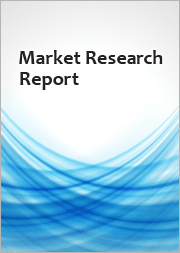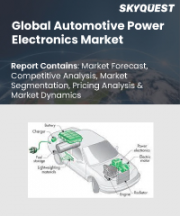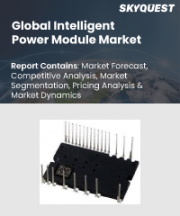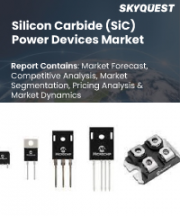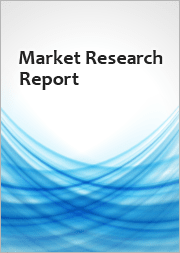
|
시장보고서
상품코드
1581269
탄화규소 파워 모듈 시장 : 디바이스 유형, 구성, 재료 유형, 최종 사용자별 예측(2025-2030년)Silicon Carbide Power Module Market by Device Type (IGBT Modules, MOSFET Modules), Configuration (Dual Module, Multi-Pack Module, Single Module), Material Type, End-User - Global Forecast 2025-2030 |
||||||
탄화규소 파워 모듈 시장은 2023년에 29억 7,000만 달러로 평가되었고, 2024년에는 34억 2,000만 달러에 이를 것으로 예측되고, 2030년에는 84억 5,000만 달러로 성장할 것으로 복합 연간 성장률(CAGR) 16.10%로 예측됩니다.
탄화규소(SiC) 전력 모듈 시장은 에너지 효율 향상, 시스템 크기 축소, 다양한 용도에서 열 관리 강화를 촉진하는 고급 전력 전자 제품을 포함합니다. SiC 파워 모듈은 자동차, 신재생에너지, 산업기기 등의 분야에서 전동화 동향을 지원하는 효율적인 파워 시스템에 대한 수요가 증가함에 따라 점점 더 요구되고 있습니다. 특히 전기자동차(EV), 태양광 인버터, 산업용 모터 드라이브에서는 고효율, 소형화, 견고성이 매우 중요합니다. 최종 용도는 자동차, 에너지 및 전력, 산업, 항공우주 및 방위 등 다방면에 걸칩니다. 주요 성장 요인으로는 깨끗하고 지속 가능한 에너지로의 세계 변화, 파워 일렉트로닉스 기술 발전, EV 채용 증가 등이 있습니다. 신재생에너지 인프라 투자가 시장 확대를 더욱 촉진하고 SiC 재료 제조와 모듈 설계 혁신이 새로운 길을 열고 있습니다. 잠재적인 비즈니스 기회는 비용 효율적인 SiC 생산을 위한 연구개발 강화, 시장 진입 확대를 위한 파트너십, 기술 발전을 활용하기 위한 전략적 합병에 있습니다.
| 주요 시장 통계 | |
|---|---|
| 기준년(2023) | 29억 7,000만 달러 |
| 예측년(2024) | 34억 2,000만 달러 |
| 예측년(2030) | 84억 5,000만 달러 |
| 복합 연간 성장률(CAGR)(%) | 16.10% |
그러나 SiC 기술과 관련된 높은 비용과 특수 제조 공정의 필요성과 같은 과제는 시장 성장을 제한하고 있습니다. 게다가 공급망의 제약과 기술의 복잡성은 큰 장애물이 되었습니다. 시장 경쟁 격화와 규제 틀도 성장 궤도에 영향을 미칩니다. 기업은 비용 효율적인 제조 기술 개발과 SiC 기술 확장성 향상에 주력해야 합니다. 기술 혁신 분야에는 방열 방법 강화, SiC와 다른 반도체 재료의 통합, 기존 시스템의 구현을 단순화하는 모듈 설계 등이 포함될 수 있습니다. 시장 역학은 급속한 기술 진화와 경쟁 압력을 특징으로 하며, 앞으로 가기 위해서는 지속적인 기술 혁신이 필요합니다. 에너지 효율적인 솔루션에 대한 수요가 증가함에 따라 기업은 환경 지속성과 효율성에 따른 연구에 투자함으로써 자본을 얻을 수 있으며, 결국 업계 전반에 걸쳐 SiC 파워 모듈이 널리 받아 들여집니다. 더 원활하게 마이그레이션할 수 있습니다.
시장 역학 : 급속히 진화하는 탄화규소 파워 모듈 시장의 주요 시장 인사이트 공개
탄화규소 파워 모듈 시장은 수요 및 공급의 역동적 인 상호 작용에 의해 변모하고 있습니다. 이러한 시장 역학의 진화를 이해함으로써 기업은 충분한 정보를 바탕으로 투자결정, 전략적 결정 정밀화, 새로운 비즈니스 기회 획득에 대비할 수 있습니다. 이러한 동향을 종합적으로 파악함으로써 기업은 정치적, 지리적, 기술적, 사회적, 경제적인 영역에 걸친 다양한 리스크를 경감할 수 있음과 동시에, 소비자 행동과 그것이 제조 비용이나 구매 동향에 미치는 영향을 보다 명확하게 이해할 수 있습니다.
- 시장 성장 촉진요인
- 전력, 자동차 섹터를 업등급하기 위한 산업화와 근대화의 성장
- 자동차 산업 수요가 높아짐에 따라 전기자동차와 하이브리드 자동차용 SiC 파워 모듈의 채용이 증가.
- SiC 기술의 연구 개발에 대한 정부 및 민간 부문의 투자 증가
- 시장 성장 억제요인
- SiC 파워 모듈의 표준화와 사양이 부족하기 때문에 호환성 문제가 발생하여 최종 사용자 간의 채용이 지연되고 있습니다.
- 시장 기회
- 파워 일렉트로닉스의 발전으로 항공우주 및 통신 등 다양한 분야에서 혁신이 촉진됩니다.
- 보다 높은 전압과 온도에 대응하는 성능과 효율의 향상
- 시장의 과제
- 파워 디바이스의 성능과 수율에 영향을 미치는 SiC 파워 모듈의 생산에 있어서의 기술적 장벽
Porter's Five Forces : 탄화규소 파워 모듈 시장을 탐색하는 전략 도구
Porter's Five Forces Framework는 시장 상황경쟁 구도를 이해하는 중요한 도구입니다. Porter's Five Forces Framework는 기업의 경쟁력을 평가하고 전략적 기회를 탐구하는 명확한 기술을 제공합니다. 이 프레임워크는 기업이 시장 내 세력도를 평가하고 신규 사업의 수익성을 결정하는 데 도움이 됩니다. 이러한 인사이트을 통해 기업은 자사의 강점을 활용하고, 약점을 해결하고, 잠재적인 과제를 피할 수 있으며, 보다 강인한 시장에서의 포지셔닝을 보장할 수 있습니다.
PESTLE 분석 : 탄화규소 파워 모듈 시장에서 외부로부터의 영향 파악
외부 거시 환경 요인은 탄화규소 파워 모듈 시장의 성과 역학을 형성하는데 매우 중요한 역할을 합니다. 정치적, 경제적, 사회적, 기술적, 법적, 환경적 요인 분석은 이러한 영향을 탐색하는 데 필요한 정보를 제공합니다. PESTLE 요인을 조사함으로써 기업은 잠재적인 위험과 기회를 더 잘 이해할 수 있습니다. 이 분석을 통해 기업은 규제, 소비자 선호, 경제 동향의 변화를 예측하고 앞으로 예상되는 적극적인 의사 결정을 할 준비를 할 수 있습니다.
시장 점유율 분석 탄화규소 파워 모듈 시장에서 경쟁 구도 파악
탄화규소 파워 모듈 시장에 대한 상세한 시장 점유율 분석을 통해 공급업체의 성과를 종합적으로 평가할 수 있습니다. 기업은 수익, 고객 기반, 성장률 등 주요 지표를 비교하여 경쟁 포지셔닝을 밝힐 수 있습니다. 이 분석을 통해 시장 집중, 단편화, 통합 동향을 밝혀내고 벤더들은 경쟁이 치열해지는 가운데 자사의 지위를 높이는 전략적 의사 결정을 내리는 데 필요한 지식을 얻을 수 있습니다.
FPNV 포지셔닝 매트릭스 탄화규소 파워 모듈 시장에서 공급업체의 성능 평가
FPNV 포지셔닝 매트릭스는 탄화규소 파워 모듈 시장에서 공급업체를 평가하는 중요한 도구입니다. 이 행렬을 통해 비즈니스 조직은 공급업체의 비즈니스 전략과 제품 만족도를 기준으로 평가하여 목표에 맞는 충분한 정보를 바탕으로 의사 결정을 내릴 수 있습니다. 네 가지 사분면을 통해 공급업체를 명확하고 정확하게 세분화하여 전략 목표에 가장 적합한 파트너 및 솔루션을 파악할 수 있습니다.
전략 분석 및 권장 탄화규소 파워 모듈 시장에서 성공에 대한 길을 그립니다.
탄화규소 파워 모듈 시장 전략 분석은 시장에서의 존재를 강화하려는 기업에게 필수적입니다. 주요 자원, 능력 및 성과 지표를 검토함으로써 기업은 성장 기회를 파악하고 개선을 위해 노력할 수 있습니다. 이러한 접근 방식을 통해 경쟁 구도에서 과제를 극복하고 새로운 비즈니스 기회를 활용하여 장기적인 성공을 거둘 수 있는 체제를 구축할 수 있습니다.
이 보고서는 주요 관심 분야를 포괄하는 시장의 종합적인 분석을 제공합니다.
1. 시장 침투 : 현재 시장 환경의 상세한 검토, 주요 기업의 광범위한 데이터, 시장 도달범위 및 전반적인 영향력 평가.
2. 시장 개척도 : 신흥 시장의 성장 기회를 파악하고 기존 분야의 확장 가능성을 평가하며 미래 성장을 위한 전략적 로드맵을 제공합니다.
3. 시장 다양화 : 최근 제품 출시, 미개척 지역, 업계의 주요 진보, 시장을 형성하는 전략적 투자를 분석합니다.
4. 경쟁 평가 및 정보 : 경쟁 구도를 철저히 분석하여 시장 점유율, 사업 전략, 제품 포트폴리오, 인증, 규제 당국 승인, 특허 동향, 주요 기업의 기술 진보 등을 검증합니다.
5. 제품 개발 및 혁신 : 미래 시장 성장을 가속할 것으로 예상되는 최첨단 기술, R&D 활동, 제품 혁신을 강조합니다.
또한 이해관계자가 충분한 정보를 얻고 의사결정을 할 수 있도록 중요한 질문에 대답하고 있습니다.
1. 현재 시장 규모와 향후 성장 예측은?
2. 최고의 투자 기회를 제공하는 제품, 부문 및 지역은 어디입니까?
3. 시장을 형성하는 주요 기술 동향과 규제의 영향은?
4. 주요 벤더의 시장 점유율과 경쟁 포지션은?
5. 벤더 시장 진입, 철수 전략의 원동력이 되는 수익원과 전략적 기회는 무엇인가?
목차
제1장 서문
제2장 조사 방법
제3장 주요 요약
제4장 시장 개요
제5장 시장 인사이트
- 시장 역학
- 성장 촉진요인
- 전력, 자동차 부문의 업등급를 향한 공업화와 근대화의 진전
- 자동차 업계에서는 수요가 높아지고, 전기자동차와 하이브리드 자동차에 SiC 파워 모듈을 채용하는 케이스가 증가하고 있습니다.
- SiC 기술의 연구 개발에 대한 정부 및 민간 부문의 투자 증가
- 억제요인
- SiC 파워 모듈의 표준화와 사양의 부족으로 호환성 문제가 발생하여 최종 사용자 간의 채용이 지연되고 있습니다.
- 기회
- 파워 일렉트로닉스의 발전은 항공우주 및 통신과 같은 다양한 분야에서 혁신을 촉진합니다.
- 보다 높은 전압과 온도에 대응해, 퍼포먼스와 효율을 향상
- 과제
- SiC 파워 모듈의 제조에 있어서의 기술적 장벽이 파워 디바이스의 성능과 수율에 영향
- 성장 촉진요인
- 시장 세분화 분석
- Porter's Five Forces 분석
- PESTEL 분석
- 정치적
- 경제
- 사교
- 기술적
- 법률상
- 환경
제6장 탄화규소 파워 모듈 시장 : 디바이스 유형별
- IGBT 모듈
- MOSFET 모듈
제7장 탄화규소 파워 모듈 시장 : 구성별
- 듀얼 모듈
- 멀티팩 모듈
- 싱글 모듈
제8장 탄화규소 파워 모듈 시장 : 소재 유형별
- 순수 탄화규소(SiC)
- 탄화규소 나이탈리아드(SiCN)
제9장 탄화규소 파워 모듈 시장 : 최종 사용자별
- 항공우주 및 방어
- 자동차
- 가전
- 산업
- 신재생에너지
- 통신
제10장 아메리카의 탄화규소 파워 모듈 시장
- 아르헨티나
- 브라질
- 캐나다
- 멕시코
- 미국
제11장 아시아태평양의 탄화규소 파워 모듈 시장
- 호주
- 중국
- 인도
- 인도네시아
- 일본
- 말레이시아
- 필리핀
- 싱가포르
- 한국
- 대만
- 태국
- 베트남
제12장 유럽, 중동 및 아프리카의 탄화규소 파워 모듈 시장
- 덴마크
- 이집트
- 핀란드
- 프랑스
- 독일
- 이스라엘
- 이탈리아
- 네덜란드
- 나이지리아
- 노르웨이
- 폴란드
- 카타르
- 러시아
- 사우디아라비아
- 남아프리카
- 스페인
- 스웨덴
- 스위스
- 터키
- 아랍에미리트(UAE)
- 영국
제13장 경쟁 구도
- 시장 점유율 분석(2023년)
- FPNV 포지셔닝 매트릭스(2023년)
- 경쟁 시나리오 분석
- onsemi의 차세대 EliteSiC MOSFET은 에너지 효율을 20% 향상시켜 EV, 충전기, 태양광 발전, 지속가능성을 선도합니다.
- ZF Friedrichshafen과 NXP는 첨단 SiC 기술을 800 볼트 EV 인버터에 통합하여 효율성, 성능 및 지속가능성을 향상시키기 위해 협력하고 있습니다.
- Mitsubishi Electric, 전기자동차용 J3시리즈 탄화규소 전력 반도체 모듈 6기종을 발표, 세계의 탈탄소화와 시장 확대를 지원
- 전략 분석과 제안
기업 목록
- ABB Ltd.
- Advanced Power Electronics Corp.
- Danfoss A/S
- Efficient Power Conversion Corporation(EPC)
- Fuji Electric Co., Ltd.
- GeneSic Semiconductor, Inc.
- Global Power Technologies Group
- Infineon Technologies AG
- IXYS Corporation
- Littelfuse, Inc.
- Microchip Technology Corporation
- Mitsubishi Electric Corporation
- Navitas Semiconductor
- Powerex Inc.
- Renesas Electronics Corporation
- ROHM Semiconductor
- Semiconductor Components Industries, LLC
- Semikron International GmbH
- STMicroelectronics
- STMicroelectronics NV
- Toshiba Corporation
- United Silicon Carbide Inc.
- VisIC Technologies
- Wolfspeed, Inc.
The Silicon Carbide Power Module Market was valued at USD 2.97 billion in 2023, expected to reach USD 3.42 billion in 2024, and is projected to grow at a CAGR of 16.10%, to USD 8.45 billion by 2030.
The Silicon Carbide (SiC) Power Module market encompasses advanced power electronics that facilitate improved energy efficiency, reduced system size, and enhanced thermal management across various applications. SiC power modules are increasingly necessary due to the growing demand for efficient power systems to support electrification trends in sectors like automotive, renewable energy, and industrial equipment. They are particularly vital for electric vehicles (EVs), solar inverters, and industrial motor drives, where high efficiency, compactness, and robustness are crucial. The end-use scope spans automotive, energy and power, industrial, aerospace and defense, among others. Key growth factors include the global shift toward clean and sustainable energy, technological advancements in power electronics, and the rising adoption of EVs. Investments in renewable energy infrastructure further drive market expansion, while innovations in SiC material fabrication and module design open new avenues. The potential opportunities lie in increased R&D for cost-efficient SiC production, partnerships to broaden market reach, and strategic mergers to leverage technology advances.
| KEY MARKET STATISTICS | |
|---|---|
| Base Year [2023] | USD 2.97 billion |
| Estimated Year [2024] | USD 3.42 billion |
| Forecast Year [2030] | USD 8.45 billion |
| CAGR (%) | 16.10% |
However, challenges such as high costs associated with SiC technology and the need for specialized manufacturing processes limit market growth. Additionally, supply chain constraints and technological complexities pose significant hurdles. The market's competitive nature and evolving regulatory frameworks also affect the trajectory of growth. Businesses should focus on developing cost-effective manufacturing techniques and improving the scalability of SiC technologies. Areas of innovation could involve enhanced heat dissipation methods, integration of SiC with other semiconductor materials, and modular designs that simplify implementation in existing systems. Market dynamics are characterized by rapid technological evolution and competitive pressures, necessitating continuous innovation to stay ahead. As the demand for energy-efficient solutions escalates, businesses can capitalize by investing in research that aligns with environmental sustainability and efficiency, ultimately leading to a wider acceptance and smoother transition towards SiC power modules across industries.
Market Dynamics: Unveiling Key Market Insights in the Rapidly Evolving Silicon Carbide Power Module Market
The Silicon Carbide Power Module Market is undergoing transformative changes driven by a dynamic interplay of supply and demand factors. Understanding these evolving market dynamics prepares business organizations to make informed investment decisions, refine strategic decisions, and seize new opportunities. By gaining a comprehensive view of these trends, business organizations can mitigate various risks across political, geographic, technical, social, and economic domains while also gaining a clearer understanding of consumer behavior and its impact on manufacturing costs and purchasing trends.
- Market Drivers
- Growth in industrialization and modernization to upgrade the power & automotive sectors
- Growing demand in the automotive industry is increasingly adopting SiC power modules for electric and hybrid vehicles
- Increased governmental and private sector investments in R&D for SiC technology
- Market Restraints
- Lack of standardization and specifications for SiC power modules creating compatibility issues and slow adoption among end-user
- Market Opportunities
- Advancements in power electronics fostering innovation in various fields such as aerospace and telecommunications
- Enhancing performance & efficiency handling higher voltages and temperatures
- Market Challenges
- Technological barriers in the production of SiC power modules affecting the performance and yield of power devices
Porter's Five Forces: A Strategic Tool for Navigating the Silicon Carbide Power Module Market
Porter's five forces framework is a critical tool for understanding the competitive landscape of the Silicon Carbide Power Module Market. It offers business organizations with a clear methodology for evaluating their competitive positioning and exploring strategic opportunities. This framework helps businesses assess the power dynamics within the market and determine the profitability of new ventures. With these insights, business organizations can leverage their strengths, address weaknesses, and avoid potential challenges, ensuring a more resilient market positioning.
PESTLE Analysis: Navigating External Influences in the Silicon Carbide Power Module Market
External macro-environmental factors play a pivotal role in shaping the performance dynamics of the Silicon Carbide Power Module Market. Political, Economic, Social, Technological, Legal, and Environmental factors analysis provides the necessary information to navigate these influences. By examining PESTLE factors, businesses can better understand potential risks and opportunities. This analysis enables business organizations to anticipate changes in regulations, consumer preferences, and economic trends, ensuring they are prepared to make proactive, forward-thinking decisions.
Market Share Analysis: Understanding the Competitive Landscape in the Silicon Carbide Power Module Market
A detailed market share analysis in the Silicon Carbide Power Module Market provides a comprehensive assessment of vendors' performance. Companies can identify their competitive positioning by comparing key metrics, including revenue, customer base, and growth rates. This analysis highlights market concentration, fragmentation, and trends in consolidation, offering vendors the insights required to make strategic decisions that enhance their position in an increasingly competitive landscape.
FPNV Positioning Matrix: Evaluating Vendors' Performance in the Silicon Carbide Power Module Market
The Forefront, Pathfinder, Niche, Vital (FPNV) Positioning Matrix is a critical tool for evaluating vendors within the Silicon Carbide Power Module Market. This matrix enables business organizations to make well-informed decisions that align with their goals by assessing vendors based on their business strategy and product satisfaction. The four quadrants provide a clear and precise segmentation of vendors, helping users identify the right partners and solutions that best fit their strategic objectives.
Strategy Analysis & Recommendation: Charting a Path to Success in the Silicon Carbide Power Module Market
A strategic analysis of the Silicon Carbide Power Module Market is essential for businesses looking to strengthen their global market presence. By reviewing key resources, capabilities, and performance indicators, business organizations can identify growth opportunities and work toward improvement. This approach helps businesses navigate challenges in the competitive landscape and ensures they are well-positioned to capitalize on newer opportunities and drive long-term success.
Key Company Profiles
The report delves into recent significant developments in the Silicon Carbide Power Module Market, highlighting leading vendors and their innovative profiles. These include ABB Ltd., Advanced Power Electronics Corp., Danfoss A/S, Efficient Power Conversion Corporation (EPC), Fuji Electric Co., Ltd., GeneSic Semiconductor, Inc., Global Power Technologies Group, Infineon Technologies AG, IXYS Corporation, Littelfuse, Inc., Microchip Technology Corporation, Mitsubishi Electric Corporation, Navitas Semiconductor, Powerex Inc., Renesas Electronics Corporation, ROHM Semiconductor, Semiconductor Components Industries, LLC, Semikron International GmbH, STMicroelectronics, STMicroelectronics N.V., Toshiba Corporation, United Silicon Carbide Inc., VisIC Technologies, and Wolfspeed, Inc..
Market Segmentation & Coverage
This research report categorizes the Silicon Carbide Power Module Market to forecast the revenues and analyze trends in each of the following sub-markets:
- Based on Device Type, market is studied across IGBT Modules and MOSFET Modules.
- Based on Configuration, market is studied across Dual Module, Multi-Pack Module, and Single Module.
- Based on Material Type, market is studied across Pure Silicon Carbide (SiC) and Silicon-Carbide-Nitride (SiCN).
- Based on End-User, market is studied across Aerospace & Defense, Automotive, Consumer Electronics, Industrial, Renewable Energy, and Telecommunications.
- Based on Region, market is studied across Americas, Asia-Pacific, and Europe, Middle East & Africa. The Americas is further studied across Argentina, Brazil, Canada, Mexico, and United States. The United States is further studied across California, Florida, Illinois, New York, Ohio, Pennsylvania, and Texas. The Asia-Pacific is further studied across Australia, China, India, Indonesia, Japan, Malaysia, Philippines, Singapore, South Korea, Taiwan, Thailand, and Vietnam. The Europe, Middle East & Africa is further studied across Denmark, Egypt, Finland, France, Germany, Israel, Italy, Netherlands, Nigeria, Norway, Poland, Qatar, Russia, Saudi Arabia, South Africa, Spain, Sweden, Switzerland, Turkey, United Arab Emirates, and United Kingdom.
The report offers a comprehensive analysis of the market, covering key focus areas:
1. Market Penetration: A detailed review of the current market environment, including extensive data from top industry players, evaluating their market reach and overall influence.
2. Market Development: Identifies growth opportunities in emerging markets and assesses expansion potential in established sectors, providing a strategic roadmap for future growth.
3. Market Diversification: Analyzes recent product launches, untapped geographic regions, major industry advancements, and strategic investments reshaping the market.
4. Competitive Assessment & Intelligence: Provides a thorough analysis of the competitive landscape, examining market share, business strategies, product portfolios, certifications, regulatory approvals, patent trends, and technological advancements of key players.
5. Product Development & Innovation: Highlights cutting-edge technologies, R&D activities, and product innovations expected to drive future market growth.
The report also answers critical questions to aid stakeholders in making informed decisions:
1. What is the current market size, and what is the forecasted growth?
2. Which products, segments, and regions offer the best investment opportunities?
3. What are the key technology trends and regulatory influences shaping the market?
4. How do leading vendors rank in terms of market share and competitive positioning?
5. What revenue sources and strategic opportunities drive vendors' market entry or exit strategies?
Table of Contents
1. Preface
- 1.1. Objectives of the Study
- 1.2. Market Segmentation & Coverage
- 1.3. Years Considered for the Study
- 1.4. Currency & Pricing
- 1.5. Language
- 1.6. Stakeholders
2. Research Methodology
- 2.1. Define: Research Objective
- 2.2. Determine: Research Design
- 2.3. Prepare: Research Instrument
- 2.4. Collect: Data Source
- 2.5. Analyze: Data Interpretation
- 2.6. Formulate: Data Verification
- 2.7. Publish: Research Report
- 2.8. Repeat: Report Update
3. Executive Summary
4. Market Overview
5. Market Insights
- 5.1. Market Dynamics
- 5.1.1. Drivers
- 5.1.1.1. Growth in industrialization and modernization to upgrade the power & automotive sectors
- 5.1.1.2. Growing demand in the automotive industry is increasingly adopting SiC power modules for electric and hybrid vehicles
- 5.1.1. Drivers
- 5.1.1.3. Increased governmental and private sector investments in R&D for SiC technology
- 5.1.2. Restraints
- 5.1.2.1. Lack of standardization and specifications for SiC power modules creating compatibility issues and slow adoption among end-user
- 5.1.3. Opportunities
- 5.1.3.1. Advancements in power electronics fostering innovation in various fields such as aerospace and telecommunications
- 5.1.3.2. Enhancing performance & efficiency handling higher voltages and temperatures
- 5.1.4. Challenges
- 5.1.4.1. Technological barriers in the production of SiC power modules affecting the performance and yield of power devices
- 5.2. Market Segmentation Analysis
- 5.3. Porter's Five Forces Analysis
- 5.3.1. Threat of New Entrants
- 5.3.2. Threat of Substitutes
- 5.3.3. Bargaining Power of Customers
- 5.3.4. Bargaining Power of Suppliers
- 5.3.5. Industry Rivalry
- 5.4. PESTLE Analysis
- 5.4.1. Political
- 5.4.2. Economic
- 5.4.3. Social
- 5.4.4. Technological
- 5.4.5. Legal
- 5.4.6. Environmental
6. Silicon Carbide Power Module Market, by Device Type
- 6.1. Introduction
- 6.2. IGBT Modules
- 6.3. MOSFET Modules
7. Silicon Carbide Power Module Market, by Configuration
- 7.1. Introduction
- 7.2. Dual Module
- 7.3. Multi-Pack Module
- 7.4. Single Module
8. Silicon Carbide Power Module Market, by Material Type
- 8.1. Introduction
- 8.2. Pure Silicon Carbide (SiC)
- 8.3. Silicon-Carbide-Nitride (SiCN)
9. Silicon Carbide Power Module Market, by End-User
- 9.1. Introduction
- 9.2. Aerospace & Defense
- 9.3. Automotive
- 9.4. Consumer Electronics
- 9.5. Industrial
- 9.6. Renewable Energy
- 9.7. Telecommunications
10. Americas Silicon Carbide Power Module Market
- 10.1. Introduction
- 10.2. Argentina
- 10.3. Brazil
- 10.4. Canada
- 10.5. Mexico
- 10.6. United States
11. Asia-Pacific Silicon Carbide Power Module Market
- 11.1. Introduction
- 11.2. Australia
- 11.3. China
- 11.4. India
- 11.5. Indonesia
- 11.6. Japan
- 11.7. Malaysia
- 11.8. Philippines
- 11.9. Singapore
- 11.10. South Korea
- 11.11. Taiwan
- 11.12. Thailand
- 11.13. Vietnam
12. Europe, Middle East & Africa Silicon Carbide Power Module Market
- 12.1. Introduction
- 12.2. Denmark
- 12.3. Egypt
- 12.4. Finland
- 12.5. France
- 12.6. Germany
- 12.7. Israel
- 12.8. Italy
- 12.9. Netherlands
- 12.10. Nigeria
- 12.11. Norway
- 12.12. Poland
- 12.13. Qatar
- 12.14. Russia
- 12.15. Saudi Arabia
- 12.16. South Africa
- 12.17. Spain
- 12.18. Sweden
- 12.19. Switzerland
- 12.20. Turkey
- 12.21. United Arab Emirates
- 12.22. United Kingdom
13. Competitive Landscape
- 13.1. Market Share Analysis, 2023
- 13.2. FPNV Positioning Matrix, 2023
- 13.3. Competitive Scenario Analysis
- 13.3.1. onsemi's next-gen EliteSiC MOSFETs boost energy efficiency by 20%, lead in EVs, chargers, solar, and sustainability
- 13.3.2. ZF Friedrichshafen and NXP collaborate to integrate advanced SiC technology into 800-volt EV inverters, enhancing efficiency, performance, and sustainability
- 13.3.3. Mitsubishi Electric unveils six new J3-Series silicon carbide power semiconductor modules for electric vehicles, supporting global decarbonization and market expansion
- 13.4. Strategy Analysis & Recommendation
Companies Mentioned
- 1. ABB Ltd.
- 2. Advanced Power Electronics Corp.
- 3. Danfoss A/S
- 4. Efficient Power Conversion Corporation (EPC)
- 5. Fuji Electric Co., Ltd.
- 6. GeneSic Semiconductor, Inc.
- 7. Global Power Technologies Group
- 8. Infineon Technologies AG
- 9. IXYS Corporation
- 10. Littelfuse, Inc.
- 11. Microchip Technology Corporation
- 12. Mitsubishi Electric Corporation
- 13. Navitas Semiconductor
- 14. Powerex Inc.
- 15. Renesas Electronics Corporation
- 16. ROHM Semiconductor
- 17. Semiconductor Components Industries, LLC
- 18. Semikron International GmbH
- 19. STMicroelectronics
- 20. STMicroelectronics N.V.
- 21. Toshiba Corporation
- 22. United Silicon Carbide Inc.
- 23. VisIC Technologies
- 24. Wolfspeed, Inc.






